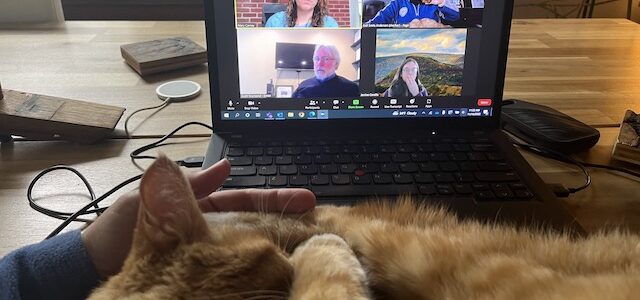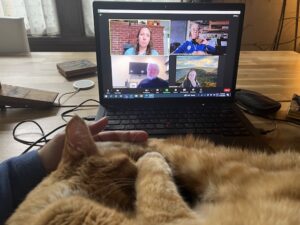
These CEOs are Dead Wrong
I read a post on FB a week or so ago, and have included the post/article below. The article is about all the prominent CEOs that are calling for a return to the office for a set number of days per week or for full-time. And I think these CEOs are dead wrong.
1) All the CEOs cited in this article that are calling for return to office are male. I think this is significant.
Traditionally, men have gone into an office to do work. Old habits die hard.
Women (again, traditionally) have done work where they are in order to manage home and family along with professions. I suggest that women can more readily activate the flexibility in hybrid and work-from-home and possibly even prefer it because it allows for all types of work style and all situations (kids, pets, elder-care, deliveries, etc.).
Old habits die hard.
2) The statements from these top-of-hierarchy individuals include things like (paraphrased) “real collaboration and innovation can’t occur remotely because we miss out on body language”.
First – I bet very few of them ever engage collaboratively, due to their role. Many CEOs I have engaged with are always on the move, and seldom in the office anyway, so this need to be in the office is somehow about the control of everyone else’s work style.
Second – I call bullshit. It takes effort and decent emotional intelligence to build connections and support teams. Creativity and innovation is about connection and inclusion – both of which can be accomplished remotely. And NEITHER of which is automatic in an in-office setting.
It takes effort and decent EQ to build connections.
3) As Lisa Whited clarifies in her book “Work Better, Save the Planet”, we created commercial offices when the equipment we needed was big and needed a stationary location. We needed to go to it to do our work. This is no longer the case. So why are we shackling ourselves to real estate?
Do we as workers exist merely to fill the edifices corporations use to promote themselves?
4) Lastly – the office itself is uncomfortable. It is loud, it tries to meet thermal comfort for everyone with one setting, you have to get there (time and carbon) and it is a pain in the butt to pack up lunch and make sure you have the coffee you like. Offices often have gang toilet rooms with no privacy, which can be hard in general, and is certainly difficult as we strive to respect all sexual identities, support nursing mothers, and be cognizant and responsive to other physical challenges. And I, personally, am still in remote access meetings most of my day, making me wonder, often, why I have to be in the office.
There is a claim that we can make offices more home-like. Well, another great question from Lisa Whited…”Whose home are we making it like?”, and why make the office like home when people who prefer to could work from home and be more productive working from that safe, comfortable, totally-works-for-them-in-every-way environment.
Whose home?
 I am currently in-office three days a week, and I still don’t understand the need for this arbitrary approach. I am an architect, and I welcome the projects and efforts that require in-person teamwork. It is invigorating and uplifting, and I am glad to be in the office with this purpose and opportunity. But I am more productive and happier in working from home when I have work I can do well there, and I can access more talent and a broader variety of team members remotely as well. It is well past time we figure out how to mentor, innovate, engage, and grow in a hybrid world. It is healthier for people and planet, more inclusive, and less expensive.
I am currently in-office three days a week, and I still don’t understand the need for this arbitrary approach. I am an architect, and I welcome the projects and efforts that require in-person teamwork. It is invigorating and uplifting, and I am glad to be in the office with this purpose and opportunity. But I am more productive and happier in working from home when I have work I can do well there, and I can access more talent and a broader variety of team members remotely as well. It is well past time we figure out how to mentor, innovate, engage, and grow in a hybrid world. It is healthier for people and planet, more inclusive, and less expensive.
I in no way mean to say that everyone wants to (or is able to) work from home or even that every project or purpose can be fulfilled by work-from-home approaches. The point, here, is how to support the workplaces and work approaches that work best for the individuals while they support the needs of the work and the firm.
Many people need to be in-office to focus and to connect. Many people are happier, more productive, and healthier working from home. Many people wish the offices were full so the atmosphere would again be exciting and vibrant. But how can we justify forcing people who work better from home to come in to make the environment lively for others? This doesn’t seem respectful of how people work at their best. And how do we make the office lively for those who want to or need to be in the office to work?
This is a tough thing to achieve. We can’t do these things the same way anymore, and, quite frankly, we were not doing them well in our full-time-in-office work environment to begin with. It will take better supervising, and a focus on training mentors and supervisors to connect with their staff. It will take clarity of what good performance actually is. It requires a willingness to identify what projects must be done in-person, and what projects and tasks can be done remotely. No offense, but the days of supervising by walking around are over. Making sure people are at their desk is NOT a good way to ensure work is being done or that productivity is high, and it never was. It was, however, easy to “supervise” this way, and it made supervisors look important and appear like they were doing their job as well. Well, now we all have to actually supervise, and mentor, and build our own careers and the careers of our staff with intention.
No offense, but the days of supervising by walking around are over.
Once again I have posted a blog that probably opens up more questions than it provides answers. We have to be willing to ask these questions if we are to respond to our changing world, and our changing world of work. I welcome you to add your thoughts and your questions (and answers) in response!
Figure out how you work best, what invigorates you, how you can support all of your co-workers, and what mentorship looks like…and be greener.
Happy 2023!
Jodi
